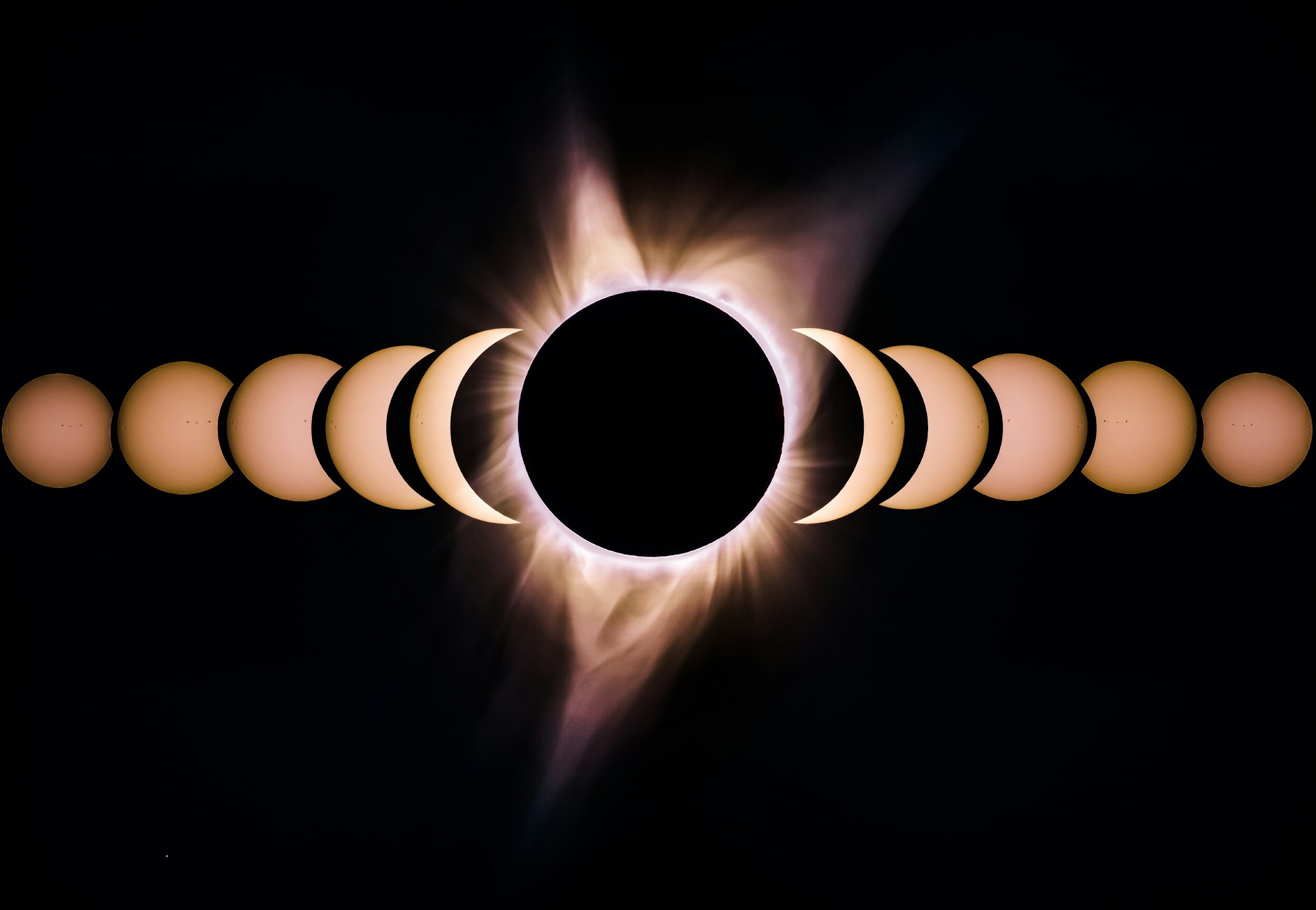How the Solar Eclipses Affect Us
Solar Eclipse this April 8th
A solar eclipse is not just a celestial phenomenon; it's an event that captivates the imagination and curiosity of millions around the globe. Occurring when the moon passes between the Earth and the sun, casting a shadow over the Earth, solar eclipses have been observed with awe and wonder throughout human history. While the scientific community views solar eclipses as opportunities for study and observation, there's a growing interest in understanding how these cosmic events influence our physical, mental, and emotional states. This article delves into the effects of solar eclipses on human health and wellbeing, and suggests intentional practices to navigate and regulate these impacts.
Understanding Solar Eclipses
The Phenomenon Explained
A solar eclipse occurs when the moon's orbit aligns in such a way that it blocks any part of the sun's light from reaching the Earth. This alignment can result in various types of eclipses: total, partial, and annular. During a total eclipse, the moon completely covers the sun, briefly turning day into night and revealing the sun's corona. A partial eclipse happens when only part of the sun is obscured, and an annular eclipse occurs when the moon is too far from Earth to completely cover the sun, leaving a "ring of fire" visible in the sky.
Ring of Fire Visible during Solar Eclipses
Types of Solar Eclipses
Total Solar Eclipse: These are rare at any given location because the moon's shadow on Earth is relatively small. It offers a unique spectacle, especially the moment of totality, when the sun's corona becomes visible.
Partial Solar Eclipse: More common than total eclipses, partial eclipses occur when the Earth passes through the penumbra of the moon's shadow, leading to only a portion of the sun being covered.
Annular Solar Eclipse: Occurring when the moon is near its apogee (the farthest point from Earth), the moon appears smaller than the sun, leaving the outer edges of the sun visible and forming an annular ring.
Physical Effects of Solar Eclipses
Indigenous Cultures views on Solar Eclipses , Indian Yogi Culture views solar eclipse as a jump forward in time.
Indigenous cultures around the world have long held profound beliefs about the impacts of solar eclipses, viewing them as powerful cosmic events that can significantly influence life on Earth. One such belief is that eclipses can accelerate the planet's progression by 30 days, thrusting us into a temporal dissonance that may leave individuals feeling fatigued, anxious, and out of sync with their natural rhythms. This perspective offers a fascinating insight into how eclipses are more than just astronomical phenomena; they're seen as catalysts for physical and spiritual upheaval.
The Impact on Well-being
The idea that an eclipse can speed up time, as perceived by some indigenous cultures, suggests a deep connection between cosmic events and human physiology. According to these beliefs, the sudden 'shift' can disrupt our circadian rhythms and biological clocks, leading to feelings of fatigue, heightened anxiety, and a general sense of being ungrounded. Such effects are thought to stem from the energetic influence of the eclipse, challenging our bodies' and minds' ability to adapt quickly to the perceived acceleration of time.
If you’re feeling anixety, fatigue, imbalanced, or depressed during this eclipse you are not alone.
Navigating the Eclipse's Influence
Understanding and respecting these indigenous perspectives can enrich our approach to managing the potential effects of solar eclipses. By acknowledging the profound impact these celestial events can have on our sense of well-being, we can better prepare for and navigate the emotional and physical sensations that may arise. This holistic view encourages us to consider the interconnectedness of all things and to approach solar eclipses not just with scientific curiosity but with a reverence for their deeper spiritual significance.
Understanding how the plantary shifts affects our emotions makes us more compassionate to ourselves and others
Mental and Emotional Impacts
Solar eclipses, with their grandeur and rarity, hold a unique place in human consciousness, often evoking a wide range of mental and emotional responses. The anticipation and experience of an eclipse can trigger profound feelings of awe and wonder, alongside anxiety and unease due to its dramatic display and the historical weight of superstition surrounding it.
Psychological Studies and Anecdotal Evidence
Research into the psychological impact of solar eclipses is sparse, yet there is anecdotal evidence suggesting that these events can elicit significant emotional responses. For some, the experience of totality can be a deeply moving, even life-changing event, fostering a sense of connection to the cosmos. For others, eclipses may stir up existential anxieties or fears, particularly among those influenced by cultural myths or astrological interpretations that frame eclipses as omens.
Coping with Eclipse-Induced Emotions
The diverse mental and emotional reactions to solar eclipses underscore the importance of preparing not just physically but also psychologically for these events. Practicing mindfulness, staying informed about the astronomical nature of eclipses, and engaging in community viewing experiences can help mitigate anxiety and enhance the positive emotional impact of witnessing an eclipse.
The Influence of Solar Eclipses on Sleep and Circadian Rhythms
While the direct impact of solar eclipses on sleep patterns and circadian rhythms has yet to be thoroughly studied, the disruption of daylight during a total eclipse could theoretically affect our internal clocks. Light plays a crucial role in regulating our sleep-wake cycle, and an unexpected period of darkness during the day might momentarily confuse our biological sense of time.
Viewing the solar eclipse with solar eclipse glasses
Scientific Insights
Circadian rhythms, our body's natural regulatory system, are primarily synchronized by the cycle of daylight and darkness. A sudden change in light, like that experienced during a total solar eclipse, could potentially signal to our bodies that it's time to prepare for sleep, even momentarily.
Eclipses and Animal Behavior: A Parallel to Human Reactions
Observations of animal behavior during solar eclipses offer intriguing parallels to human responses. Many species exhibit unusual behavior when the day suddenly turns to night. Birds may stop singing, diurnal animals might return to their nests, and nocturnal animals could become active, mistaking the eclipse for twilight.
Birds and other animals are impacted by eclipses
Studies documenting these behavioral changes provide a window into the natural world's response to solar eclipses, underscoring the event's impact across species. This animal behavior can serve as a mirror, reflecting our own reactions to the unexpected and unfamiliar.
Just as animals react to the environmental cues of an eclipse, humans too are part of the natural world and are influenced by its rhythms and changes. Recognizing this connection can help us understand our own reactions to eclipses and other significant celestial events, reminding us of our place within the broader tapestry of life on Earth.
Animals and children are most effected during eclipses
Intentional Practices to Regulate Impact
In addition to mindfulness, engaging with nature, and maintaining a regular sleep schedule, creating an intentional space within your home can serve as a sanctuary for reflection and balance, especially during the potent time of a solar eclipse. This practice involves setting aside a physical space dedicated to rituals that foster harmony in daily habits and promote a clear, positive energy flow.
Creating an intentional space using unscented pillar candles and crystals
Creating an Intentional Space for Rituals
The act of creating a designated area in your home for meditation, reflection, and engagement with intentional rituals can significantly enhance your ability to remain grounded and centered during a solar eclipse. This space should be arranged in a way that promotes tranquility and focus, free from distractions and clutter. Items that hold personal significance, such as stones, photographs, or symbols of personal aspirations, can add to the space's intentionality, making it a powerful focal point for energy work and meditation.
An Intentional Space can be anywhere in your house you spend time in, the goal is to frequent this place daily to practice self care rituals.
Incorporating the Element of Fire to Connect and Clear Energy
Fire, a powerful element associated with transformation and renewal, can be an effective tool for connecting with the cosmos and clearing energy. Lighting unscented pillar candles within your intentional space during a solar eclipse can serve as a meditative practice to focus intentions, dispel negativity, and symbolize the illumination of inner wisdom. The act of lighting a candle with specific intentions can also mark the beginning of a ritual, signaling your readiness to embrace change and seek balance in your life.
Black pillar candle flame
The warm glow of candlelight not only creates a serene atmosphere but also serves as a reminder of the light within us and the universe's cyclical nature. As you focus on the flame, visualize releasing any energies that no longer serve you and inviting in clarity, peace, and alignment with your highest self. This ritual can be a powerful means of reconnecting with your core values and aspirations, providing a sense of stability and groundedness amidst the celestial upheaval of a solar eclipse.
Integrating Rituals into Daily Habits for Balance
Incorporating small, intentional rituals into your daily routine can significantly impact your overall sense of well-being. These practices can help maintain a connection to the intentional space you've created and the equilibrium you seek to achieve. Whether it's lighting a candle each morning to set the tone for the day, meditating for a few minutes in your sacred space, or journaling your reflections by candlelight, these rituals can anchor you, providing a constant source of balance and clarity.
Candlelight journaling with unscented pillar candles.
The impact of solar eclipses on our mental, physical, and emotional states underscores the profound connection we share with the universe. These celestial events serve as powerful reminders of our place in the cosmos, offering unique moments for introspection and growth. By engaging with solar eclipses through intentional practices, creating spaces for reflection, and embracing the transformative energy they bring, we can deepen our understanding of ourselves and our interconnectedness with all of existence.
As we look forward to future eclipses, let us approach them with openness, curiosity, and a sense of wonder. Let these moments inspire us to continue exploring our personal and collective responses to the natural world, fostering a deeper appreciation for the celestial dance that illuminates our skies and our lives.
Stages of the Sun during a Solar Eclipse
Solar eclipses, with their capacity to awe and inspire, remind us of the beauty and mystery of the natural world. By embracing these events with intention and mindfulness, we can harness their energy for personal reflection, growth, and connection. As we navigate the shifts they bring, let us remember to stay grounded, open-hearted, and receptive to the lessons they offer. In doing so, we honor our ancient connection to the cosmos, finding balance and harmony within the cycles of light and darkness that shape our journey through life.
As Always,
Love & Light From your Alkeme Fam <3


















